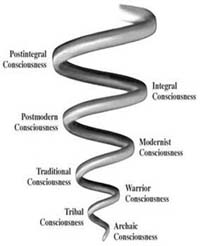The Future of Filmmaking is Integral
I’ve recently fallen in love with Ken Wilber, the thought leader of Integral Theory, and I got to thinking, what would “integral filmmaking” look like?
Integral documentary films would be less about blaming the bad guy and more about investigating solutions that are just now emerging.
Without getting too nerdy about Wilber’s take on spiral dynamics theory…think about filmmaking sensibilities in terms of stages of human development.
A modernist film (orange, if you’re familiar with the color-coded spiral dynamics model) would champion progress with a capital “P”.
A post-modern documentary (green) would promote egalitarianism and critique the excesses of modernity, such as overpopulation and climate change.
And an integral documentary (yellow) would, at a minimum, transcend the gloomy tendency of many green docs.
For example, many investigative or social issue documentaries (green) critique economic injustice or environmental degradation without offering the viewer more than crumbs by way of hopeful alternatives. Examples include “Inside Job”, “No End in Sight” and “Capitalism”.
Wilber uses the phrase “mean green meme” to point out the excesses of a sensibility that is focused on critiquing. Who wants to make mean-spirited, vindictive and depressing films?
And who wants to watch, say, a film about HIV in South Africa? Well, you might some upcoming Thursday night, if the story was about a young urban professional who quit his job to make a difference there. Which is the narrative arc of a wonderfully inspiring film that we at New Doc Editing recently edited (look out for Anthony Ream’s “Into The Haven”).
I propose a more integral approach to filmmaking, what I’ve also been calling “The New Documentary Movement”. Examples include recent Sundance documentaries such as “Sing Your Song” and “Being Elmo,“ as well as documentaries directed by my past story consulting clients, such as Katie Teague’s “Money and Life” and Tiffany Shlain’s “Connected”.
These inspiring documentaries consciously eschew a doom-and-gloom sensibility without shying away from problems such as brain cancer and our debt-based banking system.
There will always be a place for David and Goliath-type documentaries that speak truth to power.
But the future of documentary filmmaking is becoming more integral-minded. Members of my upcoming New Doc Inner Circle, for example, will be encouraged and guided in making inspiring documentaries that treat evil with compassion and understanding (an integral perspective) and offer inspiring bold new ideas for solving problems. Join us.
To find out more about the Inner Circle, which begins September 30th, go to:
newdocediting.com/land/innercircle
Here’s what one recent Inner Circle member, Tom Duncan, had to say about it:
“The Inner Circle program was a very economical solution to identifying and tearing down the walls that held back my project. I was at a crossroads and close to hanging it up. Karen’s written and video analysis of my footage, along with her tutorials, gave me the courage and tools I needed to stand back and re-think my vision so I could make adjustments in a more objective way. THAT’s a remarkable accomplishment for me, and I can’t help feel that I owe you my deepest gratitude.”
